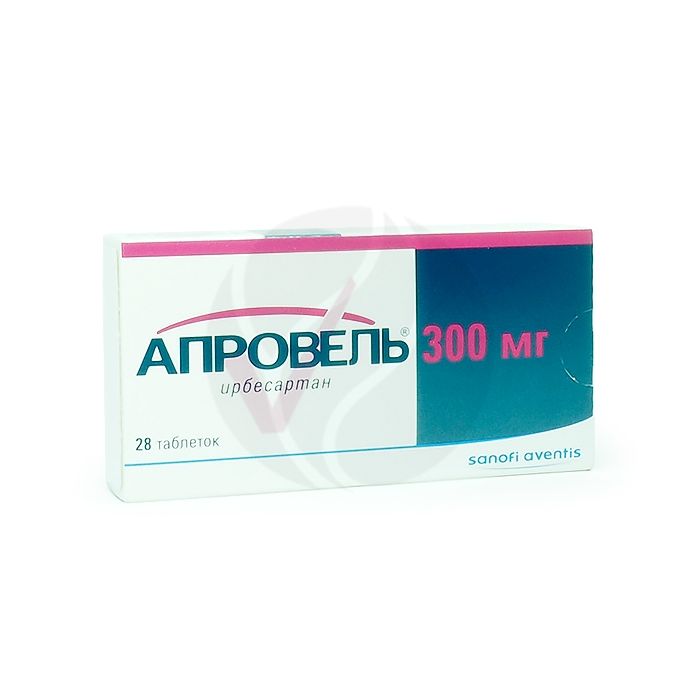Aprovel 300mg tablets, No. 28
Expiration Date: 05/2027
Russian Pharmacy name:
Апровель таблетки 300мг, №28
arterial hypertension (monotherapy and in combination with other antihypertensive drugs, for example, thiazide diuretics, ?-blockers, CCBs);
nephropathy in arterial hypertension and type 2 diabetes mellitus (as part of combined antihypertensive therapy).
Inside, regardless of food intake, the tablet is swallowed whole with water. The usual starting dose is 150 mg once a day. Patients in whom an additional decrease in blood pressure is required to achieve target values ??of blood pressure, the dose can be increased to 300 mg once a day.
In case of insufficient decrease in blood pressure during monotherapy with AprovelЃ, diuretics (for example, hydrochlorothiazide 12.5 mg / day) or other antihypertensive drugs (for example? -Adrenoceptor blockers or long-acting CCBs) may be added to the treatment.
In patients with nephropathy with arterial hypertension and type 2 diabetes mellitus, the preferred maintenance dose is 300 mg once a day.
Separate patient groups
Children and adolescents. To date, the safety and efficacy of the drug in pediatric and adolescent patients has not been established.
Elderly patients. Usually, in elderly patients, dose reduction is not required. In patients who took the drug AprovelЃ in clinical trials, in general, there were no differences in efficacy and safety between patients aged 65 years and older and younger.
Patients with hepatic impairment. Usually, in patients with impaired liver function (mild to moderate severity), dose reduction is not required. There is no experience of using the drug in patients with severe hepatic impairment.
Patients with renal impairment. Usually, in patients with renal insufficiency (regardless of its severity), dose reduction is not required.
Patients with hypovolemia. In patients with severe hypovolemia and / or hyponatremia, such as patients receiving intensive diuretic therapy or on hemodialysis, hypovolemia and hyponatremia should be corrected before using AprovelЃ.
| Film-coated tablets | 1 tab. |
| active substance: | |
| irbesartan | 150 mg |
| 300 mg | |
| excipients: lactose monohydrate - 51/102 mg; MCC - 27/54 mg; croscarmellose sodium - 12/24 mg; magnesium stearate - 2.5 / 5 mg; colloidal silicon dioxide - 2.5 / 5 mg; hypromellose - 5/10 mg | |
| film shell: Opadry white (lactose monohydrate - 36%, hypromellose - 28%, macrogol-3000 - 10%, titanium dioxide (E171) - 26%) - 10/20 mg; carnauba wax - <0.05 / 0.1 mg |
hypersensitivity to any component of the drug;
simultaneous use with medicinal products containing aliskiren in patients with diabetes mellitus or moderate and severe renal failure (glomerular filtration rate (GFR) <60 ml / min / 1.73 m2 of body surface);
simultaneous use with ACE inhibitors in patients with diabetic nephropathy;
hereditary galactose intolerance, lactase deficiency or glucose-galactose malabsorption;
severe hepatic impairment (functional class C or more than 9 points on the Child-Pugh scale) (lack of clinical experience);
pregnancy;
breastfeeding period;
age up to 18 years (efficacy and safety have not been established).
With caution in conditions such as:
aortic or mitral valve stenosis or hypertrophic obstructive cardiomyopathy;
hypovolemia, hyponatremia, arising from treatment with diuretics, hemodialysis;
adherence to a diet with limited consumption of table salt, diarrhea, vomiting (danger of excessive decrease in blood pressure);
patients with renal function dependent on RAAS activity (including patients with arterial hypertension with bilateral or unilateral renal artery stenosis or chronic heart failure of functional class III Ц IV (NYHA classification) (see УSpecial instructionsФ);
ischemic heart disease and / or clinically significant atherosclerosis of the cerebral vessels (with an excessive decrease in blood pressure, there is a risk of increased ischemic disorders, up to the development of acute myocardial infarction and stroke);
renal failure (requires monitoring of potassium and creatinine concentration in the blood), recent kidney transplantation (lack of clinical experience);
the simultaneous use of NSAIDs, including selective COX-2 inhibitors (an increased risk of developing renal dysfunction, including the possibility of developing acute renal failure and an increase in serum potassium, especially in elderly patients, patients with hypovolemia, including those taking diuretics, or with impaired function kidney (see 'Interaction');
use in combination with ACE inhibitors or aliskiren, because (in comparison with monotherapy with double blockade of the RAAS) there is an increased risk of developing an excessive decrease in blood pressure, hyperkalemia and impaired renal function (see 'Special instructions').

